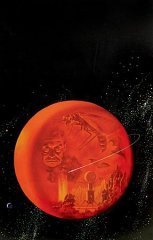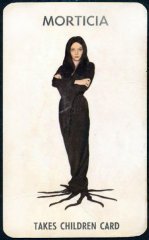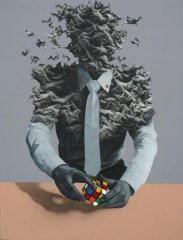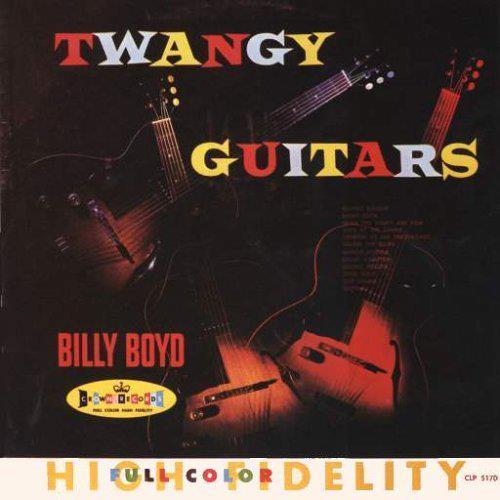Tad Williams's Blog, page 31
June 7, 2012
Kites, food, confusion, park.
6 June 2012

Tad’s Mood Today
We lost Ray Bradbury. RIP.

They say all babies look like Winston Churchill, but I’m not sure that’s true. I mean, let’s take this random baby here, and…OH MY GOD.
Never mind.
RIP Ray Bradbury, an American original. Travel well.
5 June 2012

Tad’s Mood Today
4 June 2012

Tad’s Mood Today

The first Bobby Dollar is out making the rounds. I feel like I’m dying for reviews, but I also know that’s a treacherous headspace to be in, because I always am more distressed about bad (or even insufficiently glowing for my fragile little ego) than I am buoyed by good reviews.
Family brawl. Kites, food, confusion, park. Great fun. Many of my favorite people, out of doors, with cookies, too. What’s not to like?
3 June 2012

Tad’s Mood Today
I’m having a quiet, contemplative night. That’s a good thing.
Can’t see the video in your RSS reader or email? Click here.
Addictive.
MapCrunch – Random Google Street View
www.mapcrunch.com
I’m always seeing things about hemp on Facebook. I’m willing to believe that it’s a wonder plant, and that the only reason people don’t use it in the US is because it’s illegal. How about in other places, like the Netherlands, where they’re not so paranoid about the marijuana angle? Do they use it for all those other cool things, too?
2 June 2012

Tad’s Mood Today
Okay, I need a little help. Anyone know anyone who can answer a bunch of weird questions about stars? I mean, really nitty-gritty stuff about how the physics work and how they MIGHT work in weird science-fictional situations? Because I need a bunch of information so I can write a story.
The hell with the pets, I want one of these for me.
Japanese Nanotechnology Pet Beds
www.thinkgeek.com
1 June 2012

Tad’s Mood Today
31 May 2012

Tad’s Mood Today

I’d hit that.

Well? Have you?
30 May 2012

Tad’s Mood Today

June 5, 2012
Boudicca: Debradore’s Army
I have 12 more proof copies of The Dirty Streets of Heaven, and I need people who will read them and be active on the web, generating chatter about Tad’s new Bobby Dollar series, primarily in the last weeks of August and the first week of September. We want lively, real chatter, and critical discussion, as well as delight — but not hagiographic writing (and if you hate the book I need you to tell me straight off).
I will be emailing a few ideas & instructions along the way — not quite sure what since this is new to me too. Any ideas will be gratefully received. Self-interest actively sought! Email me if you want to be part of this — deborah.shazam@batnet.com. Thank you.

June 4, 2012
New Video Spot for THE DIRTY STREETS OF HEAVEN
Tad is in a new video spot on the Barnes and Noble page for The Dirty Streets of Heaven. The page is in development, but you can scroll down to watch the video now.
The Dirty Streets of Heaven on Barnes and Noble.
The Dirty Streets of Heaven will be released September 4, 2012. Don’t miss it — pre-order your copy today!

The Groovers’ Grotto: Memory Boxes, Secret Histories and Music (Always Music)
To quote a favored, silly-serious culture hero of both your humble Grottomaster and Mr. Otherland himself : ‘life’s like that, isn’t it?’
And while I wouldn’t dare speak for T.W., my last few weeks have been chock-full of occurrences both affirming and intense. Meeting up after 30+ years with one of my few genuine pals from high school, now head of our home state’s House of Delegates, was one of the former. A hair-raising health scare involving my partner, and the seeing of a mutual longtime friend to her final rest, made up the other end of this spectrum.
Somewhere in between was getting a large, 20-lb. parcel in the post from my mother. Mom recently decided to give up the house our family lived in for many years for cheaper, less roomy digs. Thus, a lot of things needed to be gotten rid of, including items from me and my sibling’s childhoods (keeping essential family memorabilia for herself, natch). Hence this ‘memory box’ – whole chunks of juvenile evidence, school records, baby shoes (not bronzed), honest if teen-angsty personal journals, early creative writing and more – showing up at my door.
A lack of storage space in my shared flat, along with my own trepidation over hanging onto perhaps unnecessary minutiae, meant that 95% of said box went in the trash (luckily, with Mom’s considerate blessing). All the same, it’s amazing the recall one has when sorting for several hours through such things of a life’s past, both good and bad.
Memory is always a faulty and deceptive thing: it wants to be rose-colored but is usually more black and blue instead. It also can be a reminder of the potential one had as a kid, a measuring device for how close one stuck to the promise in that potential over time.
As for me, it’s pretty bittersweet to read old junior high/HS essays, or articles for the school paper (and yes, I was its resident rock critic), at once feeling thrilled that there was a creative spark even then, while also feeling a ripple of brood over how much one has kept or not kept true to it all these years.
Mostly though, it was heartwarming and surprising (for better or worse) bits that the box recalled. Did I really plan out a production script for my high school Drama class of a one-act play by Leonard Cohen, perhaps the only one he ever wrote? Here’s the script. Did I really, at age eight, dress up like (what I thought was) Mick Jagger and do a lip-synch mime to ‘Let’s Spend The Night Together’ for the school talent show? Here’s the playbill…and snapshots.
And so it is that, before delving into the at times embarrassing self-revelations of the enclosed journals, we judiciously draw the curtains.
Of course, everyone has their caches of memory – accompanied by sorrow, if not thorn. Most mean everything to the person who lived those memories and nothing to anyone else, which is maybe and non-judgmentally as it should be. Then there are those fortunate ones whose memories are so singular and vivid that they can potentially serve as education to future generations.
A recent one I was lucky to pick up on is the memoir of O.G. Los Angeles punk rocker Alice Bag, Violence Girl: East L.A. Rage To Hollywood Stage, A Chicana Punk Story (Feral House Press).
L.A.’s ‘70s punk scene always seems to come in third in the conventional-wisdom hierarchy behind London and New York – indeed, many on those scenes regarded the So. Cali contingent as bandwagon jumpers of no importance.
Which is a shame: while perhaps ultimately overshadowed by the Hardcore mob, the original prime movers in the L.A. Punk community – including The Germs, The Weirdos, X, The Dils, and personal favorites The Last – produced some quality beat noise, the best of which still holds up on this side of the Millennium.
Growing up in the Latino community of East L.A. within a fractious working-class environment, the young Alicia Armendariz found in music – first as a teenage Elton John fan, then becoming aware of what became Punk via magazines and a legendary Patti Smith Group gig at L.A.’s Roxy – a means of expression and escape from a fractious working-class upbringing.
Thus emboldened, Violence Girl follows the girl now called Alice as she takes the leap from spectator to performer, finding infamy as the fiery front-woman of The Bags, rocking the underground rock dives of late ’70s L.A. with songs like ‘We Don’t Need The English’, and cutting a single for local indie label Dangerhouse (their now-classic ‘Survive’).
Simply but capably, Alice recounts the highs and the lows of L.A. Punk life, not shying away from its more unpleasant aspects, not least of which was prejudice towards Mexicans and Latinos from both within and without the scene.
It’s a highly personal and entertaining read, bringing to light the story of a woman whom to this day – whether it’s teaching literacy skills to Nicaraguan villagers, or maintaining an invaluable ‘Women Of L.A. Punk’ website (at alicebag.com) – has clearly hung onto the values of independent, individual thought and action.
(And who is still an amazing performer as well, having seen her tear it up earlier this year, at a combo reading/miniset at San Francisco’s intimate SubMission art/music dive.)
As mentioned above, L.A.’s Punk scene then and now has never received the love that those in London and NYC did (and I’m sure folks in Cleveland, Toronto, Wash. D.C. and right here in San Francisco feel similarly aggrieved). One of the more choice attempts at redress was UK label Domino’s recent excellent CD anthol Black Hole: California Punk 1977-1980, assembled by the veteran British pop-culture scribe and historian Jon Savage.
I’ve always had time for stuff under Savage’s byline since the ‘70s – let’s not forget he wrote the damn-near-definitive history of Punk, England’s Dreaming. And while he has had his share of disses for being ‘pretentious’ and ‘too intellectual’ over the years, it’s precisely Savage’s intellectual curiosity and articulation of that hunger for extraordinary sounds that, for me, makes his writing and archival work valuable.
Add to that the fact that, compared to most pop-culture observers of an academic bent, when reading Savage one gets a sense of someone far more engaged with their subject than detached. I mean, try as I might, I can never imagine Greil Marcus pogoing down front at a Punk gig.
Even more recently, Savage can also take credit for a marvelous compilation of that what came after Punk’s initial buzz dissipated on both sides of the Pond. Called Fame: Jon Savage’s Secret History of Post-Punk, 1978-1981, Savage has skimmed an enlightening and diverse mix from the pool of sonic streams that split off from Punk, a time when anything beyond the codifying, three-chord loud fast and snotty was deemed valid, worth doing and hearing.
Thus, these representative slabs take many forms: electronic abstraction, jumpy trebly art-guitar racket (whether from London or downtown NYC), head-spinning beat blare, midnight musings, and no-apologies, confrontational non-music. With deep cuts from the likes of Cabaret Voltaire, Pere Ubu, Subway Sect, Mars, DNA and Chrome, along with obscurities from Joy Division, Wire, Human League and more besides, it forms a seriously Sci-Fi portrait of a musical future both dystopian and utopian.
Released in the UK by the Caroline True label (albeit in a limited, 2-LP vinyl edition), it’s truly well worth snapping up.
Out of space, but more to come in a decidedly horror-ific style anon: everything from the unsavory slime of early Rock and Roll that would inspire two crazy kids named Lux and Ivy, to what we’ll call ‘The Night and Day Of The Living Dead Ramones’. Till then: Pleasant…screams? Myah haha hah.
MLH
6/3/12

May 31, 2012
Boudicca: From “Publishers’ Lunch” 5/31/2012
Publisher defendants Penguin and Macmillan filed their first answers to the Department of Justice’s antitrust law suit in Federal Court on Tuesday, with both companies categorically denying the charges. Most broadly, Penguin repeats its contention that it “did not conspire to fix the prices of eBooks with other publishers or with Apple. Penguin, at the invitation of Apple, independently negotiated and ultimately entered into a vertical distribution agreement with Apple.” They argue “a vertical distribution agreement is presumptively pro-competitive. New entry is presumptively pro-competitive. Broader distribution is presumptively pro-competitive. Lower barriers to entry are presumptively pro-competitive. Yet the Government intentionally ignores these facts with regard to Penguin’s decision to distribute its eBooks through Apple and instead sides with a monopolist.”
Penguin’s 74-page answer is by far the more detailed of the two, offering point-by-point rebuttals to many of the government’s allegations. Among their very specific points Penguin notes that in December 2009 it was not windowing ebook releases, “nor did it ever have plans to do so,” which “was contrary to that undertaken by other publishers” and contrary to the theory that this was evidence of collusion on their part.
They deny that the wholesale model was firmly established for the nascent ebook market and note that they were selling ebooks directly to consumers from their web site before the agency model was launched, setting their own prices, “which was clearly not a ‘wholesale model.’” As Apple underscored in their answer, Penguin also points out that they were already “selling ebooks through the Apple App Store under the agency model prior to the introduction of the iPad” (and prior to the alleged conspiracy).
Penguin confirms that Project Z was the name for the aNobii joint venture and Project Muse was the name for the Bookish joint venture, and they say those projects were the focus of worldwide ceo John Makinson’s strategic plan prepared on August 4, 2009 for the Pearson board that the government then “excerpted out of context” in saying that he wrote “the industry needs to develop a common strategy.”
They argue that the restaurant dinners–attended by Makinson rather than US ceo David Shanks–were primarily “purely social matters” and that when “general book industry issues and trends were discussed at high-levels of generality, Makinson did so pursuant to antitrust legal advice and avoided competitively sensitive topics like terms of trade, prices, or confidential competitive matters. Certain potential joint venture proposals were also discussed. Penguin specifically denies that the purpose of any such gathering was to coordinate or fix prices or that any agreements to fix prices were reached at any such gathering.”
Penguin says e-mails to Apple’s Eddy Cue prior to the execution of a contract for the iBookstore actually show that the publisher was not ”part of a publisher conspiracy; otherwise it would not have to have asked Apple for confirmation” that multiple other publishers were also participating. The company says it had a legitimate business concern in seeking “an assurance from Apple…that a number of publishers would be selling their eBooks in the iBookstore because Penguin wanted to sell its eBooks on a platform that would attract the greatest number of customers.” They also “wanted to be assured that Apple was committed to a full-scale, viable iBookstore,” in part in case “Amazon punitively refused to sell Penguin titles on its website in retaliation for Penguin entering a business relationship with a new competitor.”
To further refute the conspiracy charge, Penguin cites internal emails that show as late as January 25, 2010, Penguin “decided not to agree to the agency terms as proposed by Apple, and not be part of opening the iBookstore. Only after negotiating new and different deal terms–which Penguin believes are unique to it and its business model–did Penguin change course and enter into an agency agreement with Apple. ”
David Shanks testified that his alleged pressure on Markus Dohle of Random House was to argue that “the largest publisher needs to help to assure that there are book stores” and “we never talked about pricing or doing anything else.”
Penguin also produces Shanks’ entire March 4, 2010 email to Steve Riggio at Barnes & Noble and says “the email speaks for itself”:
Hi Steve. I wanted to share something that has me concerned. You know that we are working with your guys to come up with a formula where all of our accounts will be able to have the same prices on our ebooks. It will level the playing field for Penguin books and hopefully allow us to sell both paper and ebook product. The one discouraging thing as you no doubt know is that Random House has chosen to stay on their current model and allow retailers to sell at whatever price they wish. That is their prerogative. When you go on the Kindle website it could be the Random House home page. Amazon is showing us what they do to people who do not do what they want. As Penguin is looking out for B&N at what appears to be great cost to us, I would hope that B&N would be equally brutal to Publishers who have thrown in with your competition with obvious disdain for your welfare. You told me once that you were nice and Amazon played hardball and they were winning. I hope you make random House hurt like Amazon is doing to people who are looking out for the overall welfare of the publishing industry. I hope you can see how strongly I feel about this. They should not be allowed to be selfish and win. Thanks for listening. I hope to see you soon.
Throughout the answer, Penguin pulls no punches in discussing “the predatory, below-cost pricing practices of monopolist retailer Amazon, apparently designed to exclude competition and control the pricing of eBooks, that was the reason for the $9.99 price point for certain eBook titles.” They also underscore, in even more detail than Apple’s answer, their belief that the government acted on incorrect information about the state of ebook prices prior to the agency model, in which “Amazon offered some new release and other eBook titles for approximately $9.99 for some period of time after the date of release. Penguin denies that this practice was by any means consistent. For some significant points in the life cycle of nearly every new release eBook, the price at Amazon.com might be as high as $16.99 or more—significantly higher than new release eBooks are ever priced under Penguin’s agency agreements…. Penguin also denies that Amazon’s $9.99 pricing, when it occurred, involved anything other than selling product at a loss.”
The publisher admits “it viewed some of Amazon’s business practices…as anticompetitive and detrimental to the long term process of expanding opportunities for developing authors and creating more content. As the Complaint is careful to avoid stating, prior to Apple’s entry, Amazon’s share of eBook sales was 80 to 90 percent. While Amazon undoubtedly may have furthered its own interests in using eBook best sellers as loss leaders to install itself as a permanent monopolist and sell its Kindle (a closed device), it threatened the long-term, overall health of the book publishing industry by creating barriers to entry, undercutting the margins and incentives of other sellers, fostering a perception of eBooks as low-cost commodities, and threatening the viability of book publishers and authors, as well as other book selling outlets vital to the marketing and promotion of books.”
Penguin’s filing
Macmillan Says DOJ Suit Is Nothing But Slim “Circumstantial Evidence” and “Innuendo”
Macmillan’s initial answer to the Justice Department’s antitrust suit filed on Tuesday May 29 is less extensive on a point-by-point basis than Penguin’s response, but it is no less definitive in denying the government’s allegations. “Despite an extensive investigation including production of the e-mails, calendars, and telephone logs of Macmillan’s CEO and other senior management, extensive interrogatories, and two full days of deposition of Macmillan’s CEO…the lack of direct evidence of conspiracy cited in the Goernment’s complaint is telling.” They add that the case is “based entirely on the little circumstantial evidence it was able to locate during its extensive investigation, on which it piles innuendo on top of innuendo, stretches facts and implies actions that did not occur and which Macmillan denies unequivocally.”
Their concise argument is to repeat that “Macmillan independently adopted the agency model for ebooks because the wholesale model…led to Amazon’s monopolization of ebook distribution.” They add that “Macmillan did not engage in collusion with anyone prior to, while, or after adopting the agency model, and it flatly denies the substance of the government’s complaint.”
The company’s answer to the charges of improper dinner conversation among publishing executives is to say that ceo John Sargent “dined once or at most twice with peers from certain other publishing houses, but these dinners were social in nature,” one of which was to welcome Markus Dohle of Random House–”a house not even alleged to be part of the alleged conspiracy”–to New York.
Of the telephone logs that show a number of calls to and from other executives at key periods, including shortly before the announcement of the iBookstore, they note that “more than half of these telephone ‘conversations’ lasted no more than a few seconds and were nothing more than missed calls…. [and] Macmillan denies that any telephone conversations between Sargent and other publisher CEOs involved collusion.”
Similarly to Penguin, Macmillan indicates that some of what the government alleges was improper conversations long before the agency model was launched related to discussions of Bookish–and Macmillan “formally, and in writing, withdrew from consideration of this joint venture in early fall 2009.” At the same time, they argue that the government willfully ignores this as a topic and recognizes that the venture and its creation were completely legal: “The government’s deafening silence about Bookish indicates its acceptance of the legitimacy of the joint venture itself and its formative process.”
Macmillan filing
Letters to Justice: Kohn’s 55-Page Brief, and Bookseller Peter Glassman’s Argument
CEO of RoyaltyShare, co-founder of eMusic, and former general counsel of companies including Borland Software Bob Kohn has dispatched a 55-page letter to the Department of Justice objecting to their price-fixing complaint in what probably qualifies as the most interesting legal brief to emerge in this case so far–even though it’s technically just a letter.
Kohn essentially offers a more thorough and artful explanation of why he believes the agency model was pro-competitive rather than anti-competitive than what the defendants themselves have provided. Without the burden (or evidence) to deny the allegations themselves, he argues in broad form that “something has gone terribly wrong with the formulation and prosecution of this case,” which the Department of Justice got the entire investigation wrong from the start, ignoring their own rules and Supreme Court case history, and he says the court should throw out the case entirely. Kohn also tells us that he wonders why the publisher defendants did not move for dismissal of the charges rather than deny the allegations.
He starts by assuming “that all of the facts alleged in the Complaint are true, drawing all reasonable inferences in favor of the government—i.e., that horizontal price fixing took place.” But he says the Supreme Court “has held that horizontal price fixing is not always illegal” and notes “music publishers engage in horizontal price fixing all the time (e.g., ASCAP/BMI), but it has been held perfectly legal.”
Kohn writes that DOJ “ignored the important intersection of antitrust law and copyright law in the formulation of its allegations.” He points to the Antitrust Guidelines for Licensing Intellectual Property jointly issued by the DOJ and the FTC–formulated in the early 1990s (“when the unique characteristics of software and digital goods were finally being understood”)–which “recognize that intellectual property, such as a copyrighted work of authorship, has characteristics that are unlike other forms of property.”
Significantly, Kohn argues that Justice “forgot that e-books have no use or value to consumers without the aid of a machine or device” and treated them just like paper books. But DOJ’s “own guidelines say you must consider the impact of defendants’ actions on ‘upstream’ markets, such as the market for the device, and e-book systems as a whole.” This is the big conceptual twist on evaluating whether competition was helped or harmed.
If the lens is changed to look at the market for ebook systems–all of which are much more expensive than individual ebooks–then the defendants’ imposition of the agency model, even by the alleged means, was “clearly pro-competitive.” Consumers may–or may not–have paid a few dollars more for individual ebooks, but the ebook reader market became intensely more competitive, and those device prices have continued to fall dramatically. Thus “if you look at the results of Defendants’ actions on the correct relevant market (e.g., e-book systems), the economic consequence was that they were clearly pro-competitive.” And if “if Defendant’s actions are pro-competitive, they cannot be a violation of antitrust law, even if the result involved higher prices of one of the components of the e-book system.”
Kohn elaborates the point further: “Appreciating this critical distinction between e-books and printed books is crucial to this case. E-books are not just digital versions of books…. E-books cannot just be read on hardware devices; they must be read on hardware devices. E-books have no value or use to a consumer without the aid of machine or device. Every reader of e-books knows this.” He concludes that “increased competition among e-books systems providers is good for consumers, even though it raises some e-books prices, because it will reduce the cost of using the e-book systems and will promote innovation among systems.”
Kohn also addresses what he terms “the abuse of overwhelming market power of Amazon.” In his view, “it should also be clear that, should Amazon succeed in monopolizing the e-book systems market, it could exact monopolistic pricing not only for e-books, but it could also raise the consumers’ switching costs. For example, suppose a consumer started to use an alternative e-book system for purchasing new e-books. Amazon will soon know that the consumer has not purchased an e-book from them in some time. It may then start charging the consumer for access to the Amazon cloud platform, in which the e-books he or she previously purchased are stored, until the consumer resumes buying e-books from Amazon.”
He tells the DOJ that acceptance of the settlement “risks the promotion of an unlawful monopoly in the e-books systems market to the detriment of e-book consumers and the public generally, one that would be very difficult to undo by the Defendant Publishers themselves (should they survive) or even by government action…. A winner-take-all monopoly over the digital gateway to works of literature, history, and science will increase prices in e-book systems and slow innovation in those systems.”
Separately, Peter Glassman from Books of Wonder raises an interesting technical point that supports Penguin’s contention that the wholesale model was not established practice for ebooks and employing a different sales model was not as radical as decision as the government concludes: ” publishers have never sold e-books under the wholesale model. Rather, they have sold them under the consignment model. Amazon and other e-book sellers never purchased or took ownership of the e-books they resold. Rather, they advertised the product, handled the transaction, and only after they had received payment and concluded the transaction did they pay the publisher for the e-book. That is consignment, not wholesale. Amazon never placed any buy orders or made any commitments to purchase specific quantities of any e-books. Unless the DOJ is seeking to change the very nature of property ownership in the United Sates and allow vendors to set prices on property they do not own nor have any commitment to purchasing, the precedent the DOJ would be setting should the DOJ win this lawsuit and go forward with its settlements could have grievous unintended consequences.”

May 30, 2012
Strange Days, Indeed
29 May 2012

Tad’s Mood Today
Do me a favor, please. My family is very involved with Neighbors Abroad, and this is their chapter. They can’t post much in the way of material on their Facebook wall until they get a certain amount of “likes”. Would you drop by and like this page so they can put stuff up to share? Thanks.
Neighbors Abroad of Palo Alto
facebook.com
Strange days, indeed. Most peculiar, Mama.

Ah, the genius that is Eddie.
28 May 2012

Tad’s Mood Today

This might just be…
…the greatest record jacket ever.

This is my arch-enemy. Or rather, it’s another bird of the same type. Mine has a more sullen, juvenile-delinquent leer, a bit like Christian Slater in “Heathers”. This frickin’ bird has been hammering at our windows every morning. Don’t know why. He just thinks it’s funny, I guess. Yeah, it’s probably because of “nature”, somehow. I hate “nature”.
27 May 2012

Tad’s Mood Today
Not sure I buy the self-portrait angle, but I can’t resist the story. And if it’s true, may I be the first to cringe in servility when our new masters appear from the deep trenches of the ocean.
Giant prehistoric krakens may have sculpted self-portraits using ichthyosaur bones
io9.com
Hop in. It’s a time machine.
The American West as you’ve never seen it before
www.dailymail.co.uk
26 May 2012

Tad’s Mood Today


Otherland MMO: Q&A Videos 3-5
 During his recent visit to Singapore, Tad took questions from the Otherland MMO community. We posted the videos for the first two questions here. The videos for questions 3 through 5 are now available.
During his recent visit to Singapore, Tad took questions from the Otherland MMO community. We posted the videos for the first two questions here. The videos for questions 3 through 5 are now available.
UPDATE: The videos are not currently available for embedding here, The videos are now available below, and you can watch them on the official Otherland Game Facebook Page, here, and on gamigo’s Otherland Forum thread, here.
In Part 3, Tad answers a question from Jonathon from Florida who asks: “Will Otherland have a dynamic quest system so not all players will have the same quests?”
In Part 4, Tad answers Azador via Otherland NetFeed who asks: “Do you plan to play the game and what feature are you most excited about?”
And in Part 5, Tad answers Nexiom via Otherland NetFeed who asks: “How much of the MMO’s storyline have you had direct input on, and how does it tie in with the actual story?”
A full playlist of all 5 videos here.

May 26, 2012
Fringehead Fan
25 May 2012

Tad’s Mood Today
Hey, we’re all of us “mixed”. That’s what makes it interesting.
DNA study seeks origin of Appalachia’s Melungeons
news.yahoo.com
24 May 2012

Tad’s Mood Today
I had already been reading about Nan Madol this evening, but when I came to the computer to look up some more information, I found out it was Lovecraft’s R’lyeh, too. Excellent.
Nan Madol Ruins located in Micronesia
atlasobscura.com
Amazingly cool. I love learning things.
Whales have a sensory organ unlike anything we’ve ever seen
io9.com
23 May 2012

Tad’s Mood Today
I seriously did not know that this would happen to me one day, or I would have lived faster to get here sooner.
Radiohead’s Kid A and OK Computer, composed entirely as old school video games
io9.com
Radiohead – Kid A (8-bit) [FULL ALBUM]
Radiohead – OK Computer (8-bit) [FULL ALBUM]
Can’t see the video in your RSS reader or email? Click here.
22 May 2012

Tad’s Mood Today
Where’s my chippie?
Okay, I’m not even a car person, but I must have all of these, stat!
The 9 Most Insane Vehicles That Are Street Legal
www.cracked.com
21 May 2012

Tad’s Mood Today
I’m a big Fringehead Fan, but I didn’t know they could do this. Most of the time they just look like grumpy old men, but then — Yow!
io9.com
I love these.
Carved Book Landscapes by Guy Laramee | Colossal
www.thisiscolossal.com
Farewell, Robin.
Bee Gees – I Started A Joke – Japan 1973.
Can’t see the video in your RSS reader or email? Click here.

May 21, 2012
Otherland MMO: Community Q&A Videos
During his recent visit to Singapore, Tad took questions from the Otherland MMO community. Here are his responses to the first two questions.
Lucas from Germany poses his question “Does the world that RealU created match up with the vision you had in your mind of Otherland?”
Melissa from Philadelphia, PA asked: “While writing Otherland, did you ever imagine that your online worlds would one day become actual online worlds?”
Check in with gamigo and the Otherland MMO page on Facebook to let them know what you think. Stay tuned for the third video when Tad answers more community questions!
Can’t see the videos in your RSS reader or email? Click here and here.

A Zen Duck-Pop
20 May 2012

Tad’s Mood Today
© Scala / Art Resource
Wow. Fascinating — and hopeful.
A virus that creates electricity
io9.com
19 May 2012

Tad’s Mood Today
I know y’all were sitting there wondering what you were going to do. Here it is — find your dream date!
Cute Animals. Bad Dates.
cuteanimalsbaddates.tumblr.com
Somedays I feel like the luckiest guy in the world. Other days…eh. But I think the truth is closer to the first.
18 May 2012

Tad’s Mood Today
If everyone and everything would just stand still for a couple of days, I’d be in great shape.
17 May 2012

Tad’s Mood Today
The meme-cycle is an ever-tightening spiral, our entire culture a Zen Duck-Pop. Still, this is a great autotune.
http://thedailywh.at/2012/05/16/early-bird-special-299/
thedailywh.at
16 May 2012

Tad’s Mood Today




